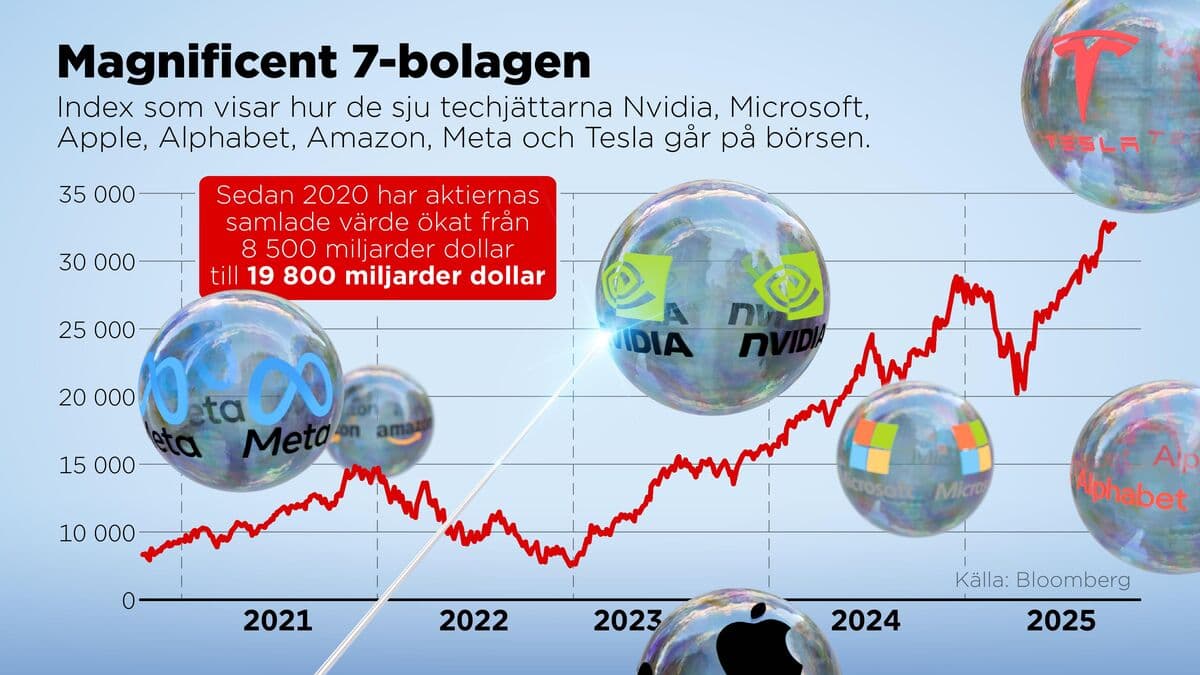“The risks in the forecast are still leaning downwards”, writes the IMF in its new edition of the World Economic Outlook.
Among other things, they point to uncertainty surrounding trade policy conflicts, the risk of negative effects on access to labor due to restricted migration flows, fiscal problems and unrest in the financial market.
“Excessively optimistic growth expectations for AI can be revised in the light of incoming data from early users and can cause a market correction”, writes the IMF.
Can become more serious than the IT crash
This can lead to what the IMF economists describe as a fall in tech stocks with system-threatening effects, which can become more serious than the IT crash of 2000-2001.
“Especially considering the dominance of a few tech companies in the index and a less regulated private credit financing for the industry's expansion”, writes the IMF.
“Such a correction can erase household assets and dampen consumption”, writes the IMF.
The US's tariff increases to 10-20 percent for most countries are substantially higher than the 2024 levels of a few percent, notes the IMF. They also note that aid budgets have been cut across the board and that migration flows in the world have been slowed down by tightened regulations – which has effects on the labor market.
So far, the Trump administration's tariffs and other protectionist measures have not had any major impact on economic activity and price development, according to the IMF's economists.
Expecting a lowered interest rate in the US
However, they note that inflation pressure and the global slowdown limit the scope for stimulus and that many economies have too many fiscal stimulus measures.
“The prospects for the global economy still point to bleak prospects, both in the short and long term”, notes the IMF.
The IMF economists expect the US central bank, the Federal Reserve (Fed), to lower the interest rate by 0.50 percentage points this year to 3.50-3.75. The cuts are then expected to continue down to 2.75-3.00 percent three years later.
In the euro zone, the interest rate is expected to be around 2 percent, while Japan is expected to start tightening with interest rate hikes.
The IMF raises the global growth forecast for this year to 3.2 percent. This can be compared to 3.0 percent in the IMF's July forecast. For next year, the global growth forecast remains unchanged at 3.1 percent.
The growth levels can be compared to 3.4 percent in 2024 and an average of 3.7 percent before the pandemic year 2020.
The growth forecast for the US – the world's largest economy – is raised by 0.1 percentage points for both forecast years: to 2.0 percent in 2025 and 2.1 percent in 2026.
For the euro zone, the forecast is raised to 1.2 percent growth this year, up by 0.2 percentage points compared to the July forecast. But for 2026, the IMF's economists lower the forecast for the euro zone by 0.1 percentage points to 1.1 percent.
The IMF's growth forecast for China – the world's second-largest economy – remains unchanged at 4.8 percent this year and 4.2 percent in 2026.
Global trade is expected to increase by 3.6 percent this year, according to the new forecast, which is 1 percentage point more than in the July calculation. For 2026, the forecast for growth in global trade is raised by 0.4 percentage points to 2.3 percent.
Source: IMF, World Economic Outlook






